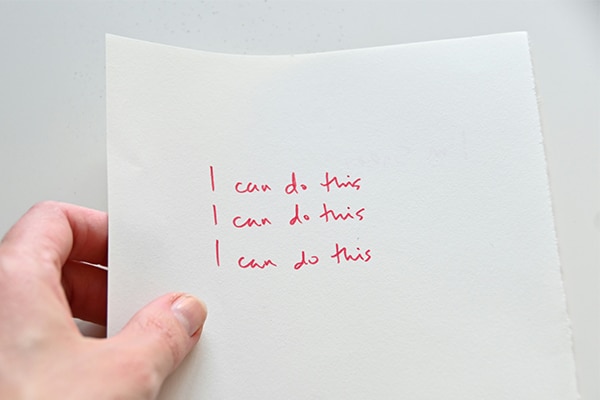Feeling anxious? You’re not alone. Whether it’s everyday stress, social nerves or moments of panic, let’s explore the signs, types and support that can help you feel calmer and more in control
Summary
1Generalised anxiety disorder
GAD involves constant worry about everyday issues – even when there's no clear reason. Your mind may feel like it won't stop...
2Social anxiety disorder
Social anxiety is a persistent fear of being judged or embarrassed. Everyday situations like group chats can feel overwhelming...
3Panic disorder
Panic disorder involves sudden panic attacks that feel intense and frightening – often with no clear trigger, leaving you dreading...
Anxiety is something we all feel from time to time. Whether it's those flutters before a big presentation or the worrying letter that keeps you up at 2am – it's completely normal. In fact, one in five adults in England experienced symptoms of general anxiety in the past year, and nearly 60% of adults in Northern Ireland report that anxiety impacts their daily lives.1
But just because it's common doesn't mean it’s easy to deal with. Let’s explore the symptoms, different types and where to turn for support – so you can feel seen, heard and a little less overwhelmed.
What’s anxiety?
Anxiety is your body’s natural response to stress. It’s the feeling of unease, worry or fear that can range from mild to intense. Everyone experiences it now and then, especially before big life moments like exams or important events (not now, sweaty palms). But if anxiety becomes persistent, overwhelming or triggers physical symptoms like a racing heart or shortness of breath, it could be a sign of an anxiety disorder.2
In fact, anxiety is one of the most common mental health challenges in the UK, with almost one in six adults reporting symptoms of a common mental disorder like anxiety or depression in the past week. Interestingly, younger people are more likely to experience anxiety, with 28% of those aged 16 to 29 reporting some form of anxiety in 2021. According to the same NHS study that year, this gradually decreases in older age groups, with only 5% of people aged 70 and over affected.3
The different types of anxiety disorders
Generalised anxiety disorder (GAD)
GAD involves constant worry about a wide range of everyday issues – think work, health, money – even when there’s no clear reason to be worried. It can feel like your mind won’t stop racing.4
Common symptoms of generalised anxiety disorder include:4
- feeling “on edge” most days
- trouble sleeping or relaxing
- tension in your neck, shoulders or jaw
- difficulty concentrating
- tiredness from constant overthinking
Helpful tips to manage GAD
- Try journalling your worries each day to release them
- Set a ‘worry window’ where you allow yourself time to think about what’s on your mind – and stick to it
- Practise calming routines like stretching or slow breathing
As generalised anxiety disorder is a clinical condition, it’s important to speak to a GP or mental health professional for further support.
Panic disorder
People with panic disorder experience regular panic attacks, often without warning. These can feel like a heart attack or being unable to breathe – and might leave you fearing the next one.5
Common panic disorder symptoms include:5
- rapid heartbeat or chest pain
- sweating, shaking or dizziness
- a sense of losing control or thinking you’re going to die
- a strong urge to escape the situation

Helpful tips to manage panic disorder
- Keep your breath slow and steady using the 4-7-8 technique
- Hold something cold (like an ice cube) to bring your focus back
- Speak to your GP – a panic disorder is treatable and manageable with support
Social anxiety disorder (sometimes known as social phobia anxiety)
Social anxiety is more than being shy – it’s a persistent fear of being judged, embarrassed or rejected in social or performance situations. For many people, it makes everyday things – like chatting in a group or eating in public – feel super overwhelming.
Common social anxiety symptoms:
- blushing, sweating or trembling
- avoiding eye contact or conversation
- overthinking interactions before and after they happen
- a strong urge to escape social settings or avoiding them in the first place
In Ireland, over 13% of adults report struggling with social phobia anxiety.6
Helpful tips to help you manage your social anxiety
- Challenge unhelpful thoughts – ask yourself, “What evidence do I have this will go wrong?”
- Start small – practice speaking in low-pressure settings like a café or walk
- Use roleplay or video practice to get used to how you come across
Health anxiety
If you find yourself constantly checking symptoms online, visiting your GP repeatedly or obsessing over the idea you might have an illness, you could be experiencing health anxiety. Health anxiety (also known as hypochondria) is when you become excessively worried about your health, often interpreting minor symptoms as serious illnesses.7 This type of anxiety can cause constant self-checking and unnecessary trips to the doctor.
If you’re experiencing health anxiety, you might:
- frequently Google symptoms
- be overly concerned about minor health issues
- avoid certain situations due to fear of becoming ill
- read symptoms and start to believe you have them
- worry that a doctor or medical tests may have missed something
It’s important to remember that health anxiety isn’t about wanting attention – it’s about the intense worry that your health is at risk, even when there’s no real threat.
Helpful tips to manage health anxiety
- Limit time spent searching online for symptoms
- Distract yourself with meaningful activities
- Seek therapy focused on cognitive behavioural techniques (CBT can be very helpful here)
Phobias
A phobia is a strong, irrational fear of a specific thing or situation – like flying, needles or spiders – that causes avoidance and anxiety.
Examples include:
- environmental: like heights, storms or germs
- animals: like snakes or dogs
- bodily functions: like a fear of blood or vomiting
- situational: like dentists, tunnels or crowds
Helpful tips to cope with phobias8
- Gradual exposure (start with small, manageable steps)
- Deep breathing during exposure to reduce panic
- Working with a therapist trained in desensitisation techniques
Obsessive-compulsive disorder (OCD)
OCD involves obsessive thoughts and repetitive behaviours or rituals done to ease distress. It’s not just about being neat or organised. Obsessions are distressing, repetitive thoughts, while compulsions are actions like checking, counting or cleaning.
OCD symptoms often require specialist support, so do speak to your GP about a referral.
Common symptoms of anxiety
You might notice a racing heart, tight chest, sweaty palms or a fluttery feeling in your stomach. Or your mind might race, sounds can seem louder and lights feel too bright. It’s as if your senses are on high alert, even if there’s no clear danger.
Anxiety can show up differently for everyone, but here are the most common types of symptoms.
When to seek help for anxiety
It’s okay to ask for help – and you don’t have to wait until things feel unbearable.
Speak to your GP if:
- anxiety affects your daily life or relationships
- you’re avoiding social, work or family activities
- panic attacks or worrying thoughts are getting worse
- you feel hopeless or overwhelmed
Useful organisations:
- NHS Talking Therapies (England & Wales)
- Mind (UK-wide)
- Anxiety UK
- Samaritans (UK & Ireland)
- Aware (Ireland)
- Mental Health Ireland
The final say
Anxiety’s part of being human – but when it lingers or intensifies, it can start to take over. Whether it’s general worry, social anxiety or panic attacks, you’re not alone and recovery is absolutely possible. With the right tools and support, you can feel more in control and live the life you want – at your own pace.
Want to hear how others cope? Read how non-drinkers navigate social anxiety at parties or explore the link between stress and digestion in Stress belly: how can stress affect your gut and what can you do?
If anxiety is impacting your daily life, don’t hesitate to speak to a GP or mental health professional. Reaching out for support is a strong and important first step.
